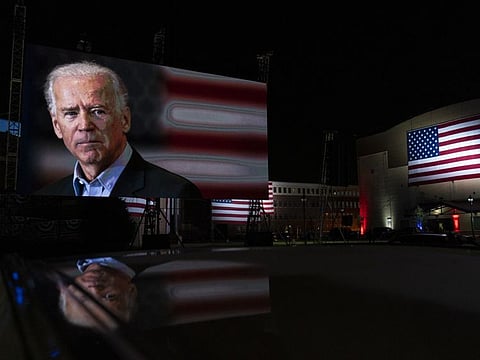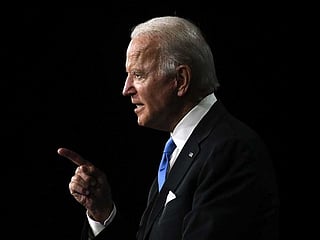Next US president must work for peace and progress in Middle East
Biden outlines forceful domestic agenda but world awaits his foreign policy vision

Joe Biden’s acceptance speech on Thursday night as the Democratic contender to take on President Donald Trump was the most important address of his nearly 50-year political career, where he cast the November election as a referendum on the US national character and delivered a forceful call for unity to heal deep political and racial divisions.
It’s still unclear how much momentum his emotive speech and the unusual Democratic convention will provide Biden as he heads into the final months of the campaign. But he ticked several domestic boxes, whether in invoking Franklin Roosevelt and his New Deal at a time of massive unemployment in the 1930s, or in recalling George Floyd and John Lewis, or in his promise to be “an ally of the light, not the darkness” as US President.
Come November, irrespective of party colours, the new US administration that is voted in must therefore continue to fully engage alongside its key allies in the Gulf and the Middle East to reinforce peace, security and stability in one of the world’s most geopolitically sensitive regionsGulf News
With the new coronavirus in the US crossing 5.74 million cases as of Friday, it is understandable that the next US presidency will be preoccupied with conquering the pandemic, rebuilding the US economy and restoring millions of lost jobs. Biden’s speech thus weighed thin on US foreign policy positions and his role as a global statesman, should he be elected as the next US President.
But apart from its domestic obligations, the US must also take a leading role in the worldwide fightback against the virus as the global economy looks to rebuild in 2021 in the aftermath of the crippling pandemic.
Key developments in the Middle East
The US presidential election also comes at a time of key developments in the Middle East where continuity and progress of policies is essential.
For instance, last week the UAE achieved what several heavyweight global powers could not – it successfully stopped Israeli annexation of Palestinian territories in the West Bank by signing a historic peace accord with Israel that was facilitated by Trump.
A new US administration must seize the momentum created by the UAE’s intervention and push for lasting peace and a two-state solution in the region.
Similarly, any US efforts to re-enter the Iran nuclear deal or review sanctions must not only take into account the latter’s refusal to comply with its nuclear obligations but also what Biden himself has frequently called “Tehran’s other malign behaviour in the region”.
Come November, irrespective of party colours, the new US administration that is voted in must therefore continue to fully engage alongside its key allies in the Gulf and the Middle East to reinforce peace, security and stability in one of the world’s most geopolitically sensitive regions.









